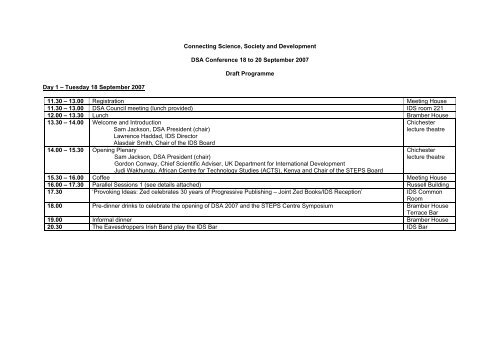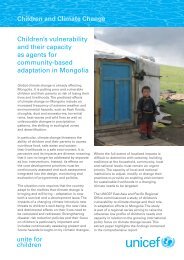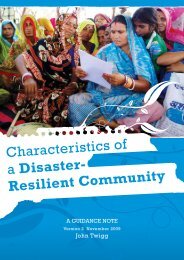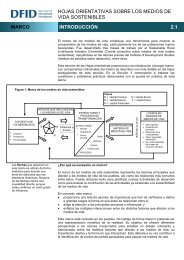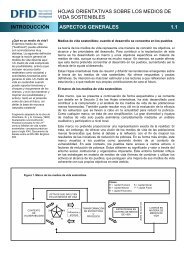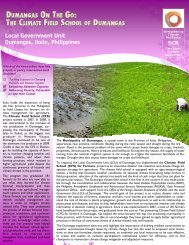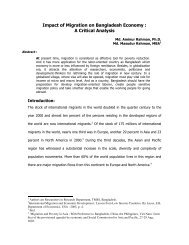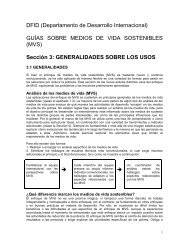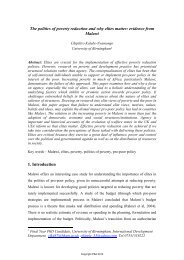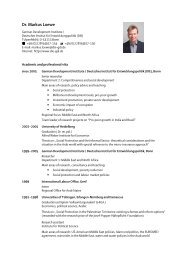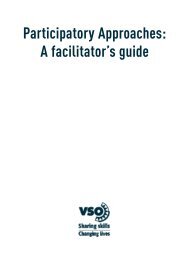Tuesday 18 Septembe - Eldis Communities
Tuesday 18 Septembe - Eldis Communities
Tuesday 18 Septembe - Eldis Communities
You also want an ePaper? Increase the reach of your titles
YUMPU automatically turns print PDFs into web optimized ePapers that Google loves.
Connecting Science, Society and DevelopmentDSA Conference <strong>18</strong> to 20 <strong>Septembe</strong>r 2007Draft ProgrammeDay 1 – <strong>Tuesday</strong> <strong>18</strong> <strong>Septembe</strong>r 200711.30 – 13.00 Registration Meeting House11.30 – 13.00 DSA Council meeting (lunch provided) IDS room 22112.00 – 13.30 Lunch Bramber House13.30 – 14.00 Welcome and IntroductionSam Jackson, DSA President (chair)Lawrence Haddad, IDS DirectorAlasdair Smith, Chair of the IDS Board14.00 – 15.30 Opening PlenarySam Jackson, DSA President (chair)Gordon Conway, Chief Scientific Adviser, UK Department for International DevelopmentJudi Wakhungu, African Centre for Technology Studies (ACTS), Kenya and Chair of the STEPS BoardChichesterlecture theatreChichesterlecture theatre15.30 – 16.00 Coffee Meeting House16.00 – 17.30 Parallel Sessions 1 (see details attached) Russell Building17.30 ‘Provoking Ideas: Zed celebrates 30 years of Progressive Publishing – Joint Zed Books/IDS Reception’ IDS CommonRoom<strong>18</strong>.00 Pre-dinner drinks to celebrate the opening of DSA 2007 and the STEPS Centre Symposium Bramber HouseTerrace Bar19.00 Informal dinner Bramber House20.30 The Eavesdroppers Irish Band play the IDS Bar IDS Bar
Day 2 – Wednesday 19 <strong>Septembe</strong>r 200709.00 – 09.30 Coffee Meeting House09.30 – 10.45 Plenary Two: Biotechnology and the MediaDavid Dickson, SciDev.net and STEPS Board member (chair)Chichesterlecture theatreEhsan Masood, freelance journalistErik Millstone, University of Sussex and STEPS memberRanjana Smetacek, MonsantoRod Harbinson, Head of Environment Programme, The Panos Institute10.45 – 11.15 Coffee Meeting House11.15 – 12.45 Parallel Sessions 2 (see details attached) Russell Building12.45 – 14.15 Lunch Bramber House13.15 – 14.00 Earthscan’s book launch for The Power of Labelling (edited by Joy Moncrieffe and Rosalind Eyben).IDS room 221What does it mean to be part of the mass known as ‘The Poor’? What visions are conjured up in our minds whensomeone is labelled ‘Muslim’? Join a debate on how we categorise and why it matters.Speakers: Rosalind Eyben and Joy Moncrieffe, IDS13.15 – 14.15 DSA AGM Russell Building14.15 – 15.30 Plenary Three: Agricultural Technology and DevelopmentSimon Maxwell, Overseas Development Institute (chair)Paul Richards, Wageningen UniversityPedro Sanchez, Director, Millennium Villages Project, The Earth Institute at Columbia University15.30 – 16.00 CoffeeLaunch of Oxfam’s new series ‘Small Guides to Big Issues’, co-published with Pluto Press.Browse and buy copies of the first three books: Climate Change, Women’s Rights and Cities. Also enjoy a piece ofFairtrade cake.room RB11Chichesterlecture theatreMeeting House16.00 – 17.30 Parallel Sessions 3 (see details attached) Russell Building17.30 Reception hosted by the Journal of Development Studies, with presentation of the Dudley Seers prize to ProfessorMick Moore, IDS.IDS Commonroom17.30 Practical Action Publishing’s double book launch and reception for Springs of Participation: Creating and EvolvingMethods for Participatory Development (edited by Karen Brock and Jethro Pettit) and The Aid Chain: Coercion andCommitment in Development NGOs (by Tina Wallace with Jennifer Chapman and Lisa Bornstein).Speakers: Robert Chambers, Jethro Pettit and Tina Wallace. Please RSVP to j.stevens@ids.ac.uk.IDS room 22119.00 Conference dinnerPrize-giving for the European Journal of Development Research and the Journal of International DevelopmentAfter dinner speaker: David King, UK Government Chief Scientific AdviserBramber House
Day 3 – Thursday 20 <strong>Septembe</strong>r 200709.00 – 09.30 Coffee Meeting House09.30 – 10.45 Plenary Four: How Radical is the Change in the Global Distribution of Innovation Activities?Hubert Schmitz, Institute of Development Studies (chair)Chichesterlecture theatreRaphie Kaplinsky, Open UniversityMartin Bell, Science Policy Research Unit, University of SussexCristina Chaminade, University of Lund, Sweden10.45 – 11.15 Coffee Meeting House11.15 – 12.45 Parallel Sessions 4 (see details attached) Russell Building12.45 – 14.15 Lunch Bramber House13.00 Routledge African, Development Studies & Development in Practice Journals Reception.Meeting HouseSpeaker: Andrea Cornwall, IDS, guest editor of latest Development in Practice journal entitled ‘Buzzwords andFuzzwords: Deconstructing Development Discourse’13.15 – 14.15 DSA Study Group Convenors meeting Russell Building14.15 – 15.00 Final Plenary: Rethinking Risk and RegulationSheila Jasanoff, Kennedy School of Government, Harvard; Science and Democracy Network; and STEPSBoard memberMelissa Leach, IDS and Director of STEPS (chair)15.00 – 16.00 Conference Wrap-up and ReflectionsShiv Visvanathan, Centre for the Study of Developing Societies, IndiaAndrew Scott, Director of Policy, Practical ActionBanji Oyelaran-Oyeyinka, Director, Monitoring & Research Division, UN-HABITAT, NairobiJoachim Voss, Director-General, International Centre for Tropical Agriculture, ColombiaSam Jackson, DSA PresidentLawrence Haddad, Director, IDS (chair)room RB11Chichesterlecture theatreChichesterlecture theatre16.00 – 16.30 Coffee and departure Meeting House
Parallel Sessions 1: <strong>Tuesday</strong> <strong>18</strong> <strong>Septembe</strong>r 16.00 – 17.30Room Title ParticipantsRB21 Knowledge, Technological Learning and Innovation for Development in Least Developed CountriesThis panel will present the findings and recommendations of The Least Developed Countries Report 2007.Charles Gore, UNCTAD (chair)Rolf Traeger and Zeljka Kozul-Wright, UNCTADMartin Bell, SPRU, University ofRB33tbcRB10Biotechnology and Policy Innovation in Sub-Saharan AfricaModern biotechnology has brought about challenges in many areas for developing countries, including the domainof technology regulation. Across Africa, many processes have been initiated to develop systems to deal withchallenges at the technological, institutional, national, cross-national and international levels. For Sub-SaharanAfrica, innovative approaches to policy development have had to be devised, to come up with effective systemsthat enable Africa to deal with the technology. This session traces some of the policy innovations witnessed on thecontinent in the last few years, with a view to assessing the impact that has been made, lessons to be drawn, andhow this enriches theoretical discourses in development, public policy, science and technology studies.Low carbon technology transfer to developing countriesThis session will discuss the issue of low carbon technology transfer to developing countries. The panel willrepresent a range of perspectives including academic, governmental and non-governmental actors. It is alsohoped that a video link to India will be possible whereby researchers from The Energy Research Institute (TERI) inDelhi will present their views on the technology transfer.The role of partnerships in delivering the science and technology agenda for Africa’s continueddevelopmentThe report of the Commission for Africa presented a strong case for investment by developed countries insupporting Africa’s system of higher education, to help build capacity for Africa’s social and economictransformation. Africa’s systems of higher education, however, are in a state of crisis brought on by years ofneglect. This situation is changing, but African HEIs need support to bridge the gaps in their own capacity todeliver. This panel will consider the role of partnerships in delivering that support, and consider the need to investin science, technology and innovation in Africa. It will consider the conflict between regional and local priorities,and look at partnerships from the point of view of northern and southern organisations, and will seek to identifysome elements of best practice.SussexJulius T Mugwagwa, Open UniversityJoanna Chataway, Open UniversityJames Smith, University ofEdinburghGordon MacKerron, SPRU, (chair)Prosanto Pal, The Energy ResourcesInstitute, IndiaAmal-Lee Amin and John Holmes,UK Department for Environment,Food and Rural AffairsDavid Ockwell and Jim Watson,SPRU, University of SussexJoy Clancy, University of Twente,The NetherlandsMyles Wickstead, Open University,formerly Head of Secretariat to theCommission for Africa.Andrew Cherry, Association ofCommonwealth UniversitiesSimon Anguma, Uganda
RB34RB20RB32The experience of people's participation in processes of technology developmentThe purpose of the session is to share practical experience of the involvement of people living in poverty in thedevelopment of technologies, and in decision-making about the technologies that they use, and to relate thisexperience to the broader themes of the conference. The session will allow conference delegates to gain a greaterunderstanding of what is happening on the ground in poor communities, and will be themed around technologiesfor the management and use of water. Questions to be raised include: How do people decide which technologiesto adopt or adapt? What are the barriers and facilitators to technology development for poverty reduction? Whatkind of institutions enable people to have a say in decisions about the technologies that affect their lives?STEPS Symposium panel: ‘Pathways to sustainability: Linking technology, poverty and social justice’Linking science and technology with the reduction of poverty and social injustice are crucial challenges, in a worldwhich is highly complex, dynamic and replete with uncertainties and conflicting understandings. This sessionintroduces the early thinking of the ESRC Social, Technological and Environmental Pathways to Sustainability(STEPS) Centre around research to address these challenges, drawing perspectives in development studiestogether with science and technology studies and cross-disciplinary perspectives on knowledge and power.Following a brief overview of the Centre's emerging 'pathways approach', three short presentations will discuss itsrelevance to current issues and debates in the health, agriculture and water domains. In discussion we willaddress implications for current policy and aid initiatives that seek to make science and technology work for thepoor.Free-standing paper session: Energy and WaterLauren Lamberton, Bernard J. Smith, Stephen Royle, and John J. McAlister, Queen’s University Belfast; and JoséA. Baptista Neto, Universidade Federal Fluminense, Brazil: ‘The Selective Impact of Environmental Pollution onSocially Marginalised Urban <strong>Communities</strong> in Transitioning Economies: A Case study from SE Brazil’Annemarije Kooijman, University of Twente: ‘Technological change from an entrepeneurs’ perspective: energychoices in small scale enterprises in rural India’Netra Chhetri, Arizona State University: ‘Multiple Realities: Stressor Analysis of Water Resources in CentralArizona’Andrew Scott (chair)Katharine Pasteur, Lucy Stevens andDavid Grimshaw, Practical ActionMelissa Leach, IDS and STEPSCentre DirectorIan Scoones, IDS and STEPS CentreCo-directorAndy Stirling, IDS and STEPS CentreCo-directorGerry Bloom, IDSJohn Thompson, IDSLyla Mehta, IDSMeena Tiwari, University of EastLondon (chair)
Parallel Sessions 2: Wednesday 19 <strong>Septembe</strong>r 11.15 – 12.45Room Title ParticipantsRB10 Science Jim, but not as we know it: The feasibility of trans-disciplinary researchThis session is the launch of a new DSA study group 'Research for Development', and aims to bring togetherdevelopment researchers' experiences of doing cross-disciplinary research in practice. Development Studiesseeks to be cross-disciplinary. Many researchers seek to integrate disciplinary insights and achieve transdisciplinarity,but there are significant intellectual and professional barriers. There are different ways ofproblematisation, axioms/assumptions on the nature of reality and human beings, methods and even differentlanguages. What exactly are we trying to do? How can we overcome barriers? What level of success haveresearchers had? What are people’s experiences and reflections? We ask participants to scribble theirthoughts/reflections and experience before the meeting and be ready for workshopping!RB21 Livestock Development Study Group Symposium: ‘Policy Dynamics vs. the Demands of the Poor: Casestudies from the livestock sector’John Morton, Mohammed Mussa and Anne Tallontire: ‘De-worming and Dysfunction: The Import of VeterinaryPharmaceuticals to Ethiopia’G.P. Juma, A.G. Drucker, I. Baltenweck, M. Ngigi: ‘Consumpton of, and Willingness to Pay for, Indigenous SmallRuminant Meat in Marsabit, Kenya’Shaheen Akter: ‘Sustainability of an Innovation for Poverty Alleviation: The case of Bangladesh Poultry Model’Claire Heffernan, Kim Thomson, Louise Nielsen: ‘Livestock vaccine adoption among Bolivian farmers: Revisitinginnovation diffusion theory’RB34RB4Technological innovation to deliver social protectionSocial protection programmes are increasingly being developed to reduce poverty throughout Africa. A keycomponent of such programmes is social transfers, which can take different forms including cash, vouchers,agricultural inputs, medicines, school fee waivers and food. Cash transfers form a growing part of theseprogrammes, but delivery can be problematic. Identifying more effective delivery mechanisms is imperative toimprove the effectiveness of transfers. A variety of innovative technologies have been piloted in southern Africa,aimed at ensuring efficient distribution to beneficiaries and reducing the management load. This parallel sessionaims to critically appraise a variety of technological innovations to deliver cash transfers.NGOs in Development: Analysing Trends and Shaping Research Agendas For The Next Five YearsThis interactive session will identify current trends in aid and their impacts for development NGOs. Questions thatmay be addressed include: what are the impacts of NGOs’ increasing involvement in service delivery?; what arethe issues relating to research on NGOs in development?; how far is the aid effectiveness agenda shrinking thespace for civil society?; what are the impacts of decentralisation of the voluntary sector?; how is the blurring ofsecurity issues with aid policy affecting civil society? It is hoped that the outcomes of this interactive session willserve to shape research agendas on NGOs engaged in development over the next five years.Andy Sumner, Institute ofDevelopment Studies (chair)Alan Thomas, Swansea UniversityMike Tribe, Bradford UniversitySam Jackson, DSA PresidentClaire Heffernan, Reading University(chair)Stephen Devereux, Institute ofDevelopment Studies (Chair)Katharine Vincent and Judith Matthis,Regional Hunger and VulnerabilityProgrammeBrian Pratt (Director, INTRAC)Katie Wright-Revolledo (Convenor)Richard Batley (University ofBirmingham)Tom Harrison, University of Oxford
RB16RB33RB17ARB20Reconnecting ICTs with developmentHistorically, analysis of information and communication technologies within development has tended to draw from,and be focused on, disciplines such as information systems, policy studies, economics, or business andmanagement. There has tended to be limited connection between ICT research and the concerns of thedevelopment studies discipline - perhaps reflecting the 'falling away' of technology as a development studies focussince the 1970s. This panel seeks to make some initial moves to reconnect analysis of ICTs to debates andinterests of development studies.African women’s experience of violence, HIV/AIDS and imposed external ‘scientific’ solutionsThis session will explore what happens to 'well established' approaches to critical development issues when thosedirectly affected - in this session especially women suffering from domestic violence, HIV/AIDS and rural womenin Africa grappling with gender frameworks - are allowed to participate in the debates and shape the responses totheir situation. The case studies are all rooted in research and activism in Africa and challenge many of thecurrent dominant development paradigms where 'rational' or scientific analysis and understanding are still taken toAfrica from here and seen as good solutions for women grappling with poverty and complex social inequalities indifferent cultures. The case material brings vividly to life their realities and how different their solutions can be.Aidless Development Framework in Sub-Saharan Africa: An AlternativeThe panel will discuss the relevance of aid for development. Alternative means of addressing poverty with a focuson scientific and technological advances will be the central theme, while participants will encouraged to challengeconventional thinking. The current debate around aid for development has become more controversial in the lastdecade than ever before. Technical and/or scientific assistance as an integral part of some development projectscan not be divorced from the question of aid dependency and sub-Saharan poverty. The availability of aid hasarguably given access to non-productive income and undermined scientific and technological research.STEPS Symposium panel: ‘Peri-urban dynamics and sustainability challenges’The peri-urban situation poses great challenges, particularly for the health and livelihood security of themarginalised and poorest. These citizens are confronted by problems arising due to contradictory or absentregulatory frameworks, contradictory technology arrangements, poor service provision, loss of agricultural landand increasing pollution. The peri-urban interface is a contested space which is valued by interest groups in manydifferent ways. This session will explore diverse understandings of the role and function of the peri-urbaninterface. The panel will consider pathways towards sustainability that link environmental sustainability withpoverty reduction and social justice in the peri-urban interface; and how a better understanding of the social,technical and ecological processes in the peri-urban interface could support pathways to sustainability.Chris Westrup, University ofManchester (chair)Shirin Madon, London School ofEconomicsMark Thompson, University ofCambridgeTina Wallace, OxfordUniversity/Open University (chair)Alice Welbourn, UN Global Coalitionon Women and AIDSKanwal Ahluwalia, WOMANKINDWorldwideMargaret Brew-Ward, GenderStudies and Human RightsDocumentation Centre, GhanaSenorina Wendoh, Affiliate toTransform NetworkDidier Matamba, University ofManchester (chair)Sobona Mtisi, Giorgios Tsopanakis,and Jenny Rodriguez, University ofManchesterFiona Marshall, SPRU, University ofSussex (co-convenor)Lyla Mehta, IDS (co-convenor)Cecilia Tacoli, International Instituteof Environment and DevelopmentIan Douglas, University ofManchesterUsha Ramanathan, InternationalEnvironmental Law ResearchCentre, New DelhiLinda Waldman and HayleyMacGregor, IDS
RB9RB12DSA Junior Research Award WinnersFestus Annor-Frempong, Ghana: ‘The Application of Action Research Methodology in the Control of TomatoInsect Pests in Wawase Community of Ashanti Region of Ghana’Alemayehu Gebeyehu Desta, Ethiopia: ‘Indigenous Knowledge in Science, Society and Development andSunarma's Intervention’Mohammed Ali Amadu, Ghana: ‘An Assessment of Social Investment Fund in support of Poverty Reduction in theDangme West District of Ghana’G.P. Juma, CGIAR; A.G. Drucker, Charles Darwin University, Australia; I. Baltenweck, International LivestockResearch Institute, Kenya; and M. Ngigi, Department of Agricultural Economics, Egerton University, Kenya:‘Market Power And Efficiency in Indigenous Small Ruminant Marketing Channels In Marsabit’Research in ProgressOver the last decade development studies has been criticised for an alleged lack of rigour and policy relevance,which has necessitated a re-think of the way we conceptualise and research development. It is also important toensure the generation of strong empirical data which can support theory, policy and practice. It is in the light ofthis that DFID is supporting this special session to examine ongoing research by junior academics and doctoralstudents with the potential of reshaping and informing future policy and practice of development. In this sessionwe seek to examine emerging policy challenges from the point of view of young researchers with limited resourcesand status. What problems do they face in achieving those same goals of rigour and policy relevance?R. Thirumavalavan: ‘Telecentres – An Epicentre for Agricultural Development in India’Hannah McDowall: ‘The Social Impact of Value Chain Governance and Upgrading for Fair Trade HandicraftProducers in Africa’Mathews Vakusi Madola: ‘Determinants and Impacts of Alternative Market Institutions on Smallholder Agriculturein Malawi: Implications for pro-Poor Growth’Samuel Boakye: ‘Every Little Helps: Land Tenure and Urban Agricultural Development in Tema District Ghana’Myles Wickstead, Open University,formerly Head of Secretariat to theCommission for Africa (chair)Joseph Assan, University ofLiverpool (coordinator)
Parallel Sessions 3: Wednesday 19 <strong>Septembe</strong>r 16.00 – 17.30Room Title ParticipantsRB4 A regional review of EU development assistanceThe two papers in this session will be reviewing the EU's aid relations with the Pacific and African ACP countriesrespectively. They will have a common theme in that they will focus upon the mechanisms of aid delivery, inparticular the contributions made by the adoption of Country Strategy Papers, illustrated by case studies.GlasgowRB34RB33RB17ARB21ICTs and multi-dimensional povertyNigel Scott, Gamos, The Role of ICTs in Development – A Summary of the EvidenceSreekumar T T Pillai, National University of Singapore, Contested Doors of Modernity: Rural Telekiosks andDilemmas of Social Inclusion in India'Meera Tiwari, University of East London: ‘ICTs and Poverty Reduction: User perspective study of rural MadhyaPradesh, India ‘Mobile phones and developmentThere has been an explosive growth in the availability of mobile phones in developing countries, including growthof access by poor and rural communities. This panel seeks to review applications of mobile telephony, taking aparticular focus on agricultural and educational services delivery.IT and the city: dynamising urban economies, facilitating e-governance or increasing inequality?This session will consider whether the use of IT in urban management improves governance or increasesinequality. The questions will be addressed through presentations on key issues related to the design andinstitutional embedding of electronic information and the ways in which power relationships govern access to anduse of IT: the use of a spatial information infrastructure to identify and address deprivation in three Indian cities,outcomes of the Bhoomi programme to digitise land records in and around Bangalore, and factors influencing theuse of electronic conferencing to build communities of practice in urban and rural Uganda.I.S.A. Baud, University of Amsterdam; K. Pfeffer, University of Amsterdam; J. Martinez-Martin, ITC; N. Sridharan,School of Planning and Architecture, New Delhi: ‘Using spatial information infrastructure in urban governancenetworks: reducing urban deprivations in Indian cities?’Bhuvaneswari Raman, LSE, and Solomon Benjamin, Department of Political Science, University of Toronto: ‘E-Governance : rationale and reality: A case study of the Bhoomi Programme in Bangalore, India’Hazel Johnson, Open University, and Gordon Wilson, Open University: ‘Supporting communities of practice inUganda: the potential of e-communication’Gender, Work and GlobalisationGlobalisation causes significant changes in the lives of women in paid work. It opens up new opportunities forStephen Dearden, ManchesterMetropolitan University (chair)Maurizio Carbone, University ofMeera Tiwari, University of EastLondon (chair)Chris Westrup (chair)Rose Luckin, Institute of EducationJohn Traxler, University ofWolverhamptonSimon Batchelor, Gamos LtdAli Hassan Mohamed, FARM-Africa,NairobiCarole Rakodi, University ofBirmingham (chair)Stephanie Barrientos, Institute ofDevelopment Studies (Chair)
RB10RB20RB32women to enter paid work, but much of that work is highly mobile, insecure and lacks access to labour rights orprotection. Women are becoming more integrated into an increasingly commercial and technical global economy,but face challenges in combining paid and unpaid activities or realising the benefits of greater economic activity.Accessing paid work is contributing to women’s changing socio-economic position and potential empowerment,but they face difficulties in organising within existing social structures and regulatory domains. This panelexamines diverse examples of women’s integration into work in a global economy, and explores some of thecomplexities of enhancing women’s social and economic rights in a more liberalised global economicenvironment.Nitya Rao, School of Development Studies, UEA: ‘Reconstructing Gender and Class: Globalisation and Women’sWork in Bangladesh’Kyoko Kusuabe & Ruth Pearson, AIT Bangkok and University of Leeds: ‘Globalisation, Gender and Labourmobility: A case study of Burmese women workers in Thailand’s border factories’Kathrin Forstner, University of East Anglia: ‘Craftswomen in a globalised world: joint craft production andmarketing in Southern Peru’Mariagrazia Leone, University of Calabria, Italy: ‘Alternative Coffee Production: Gender Empowerment in Peru’Meena Gopal, SNDT Women’s University, Mumbai: ‘Mutations in the home based beedi industry with neweconomic changes in India’Free-standing paper session: Science and ExpertiseLakhwinder Singh, Punjabi University, India: ‘Innovations, Structural Change and Public Policy: ComparativeExperience of Asian Countries’Gordon Wilson, Open University: ‘Our Knowledge Ourselves: Engineers (Re)thinking Development’Martin Reynolds, Open University: ‘Towards Reframing Professional Expert Support’STEPS Symposium panel: ‘Technologies spiralling out of control? Politics and ethics of risk andregulation of agro-biotechnology’Contrary to the understanding of technology as means of control over environment and society, it is currentlybeing debated as source of anxiety, uncertainty and risk. Contemporary debates on regulation of newtechnologies hinge on the accurate prediction of the perils. Risk prediction has become a highly contested arena,not only because the conventional science of risk assessment is proving inadequate, but also becausebiotechnology has interacted with the social context in unpredictable ways.The session will specifically discuss questions such as what is considered risky, what is in need of regulation andcontrol, underpinning what kind of ethical worldview, with what repercussions for regulatory processes?Free-standing paper session: Poverty and Conflict*Tilman Brück, DIW Berlin, Humboldt University Berlin and IZA; Alexander M. Danzer, DIW Berlin and HumboldtUniversity Berlin; Alexander Muravyev, DIW Berlin and European University Institute; and Natalia Weisshaar, DIWBerlin and Humboldt University Berlin: ‘Changes in Determinants of Poverty and Inequality during Transition:Household Survey Evidence from Ukraine’Joseph Assan, University of Liverpool: ‘Effects of Rural Out-migration and Remittance Culture on LivelihoodDiversification and Innovation in Ghana’Kati Schindler, German Institute for Economic Research: ‘The Impact of Conflict on Households:A ConceptualEsha Shah, IDS (co-convener),Adrian Smith, SPRU, (co-convener)Ian Scoones, IDS (chair)Rajeev Gowda, Indian Institute ofManagementAdrian Ely, SPRUEsha Shah, IDSPatrick van Zwanenberg, SPRUSuman Sahai, Gene Campaign, IndiaChair (tbc)
RB9RB12Framework with Reference to Widows’Donald McLellan, University of Strathclyde: Security Drivers in Developing Nations (1981-2000): ‘A Study UtilisingA Panel Data Approach’DSA Junior Research Award WinnersEmmanuel Oheneba Agyenim- Boateng, Ghana: ‘An Exploration into management of appraisal systems: Thecase of Ghanaian public sector universities’Albert Obeng Mensah, Ghana: ‘Prospects for developing School-based extension support system in junior andsenior secondary schools in the Central Region of Ghana‘Kudzai Chatiza, Zimbabwe: ‘Is Zilga on top of the local governance agenda? Reflections on how Zilga can addvalue, sustain relevance and build capacities of its members’Alice Ruhweza, Uganda: ‘Business and Ecosystems: Making the case for Businesses to Restore and MaintainEcosystems’Research in progressOver the last decade development studies has been criticised for an alleged lack of rigour and policy relevance,which has necessitated a re-think of the way we conceptualise and research development. It is also important toensure the generation of strong empirical data which can support theory, policy and practice. It is in the light ofthis that DFID is supporting this special session to examine ongoing research by junior academics and doctoralstudents with the potential of reshaping and informing future policy and practice of development. In this sessionwe seek to examine emerging policy challenges from the point of view of young researchers with limited resourcesand status. What problems do they face in achieving those same goals of rigour and policy relevance?Margaret Mwanjani Ganje Sikwese: ‘Decentralised and Community-Based Forestry: Powers and Agents inMalawi’Felix Tuodolo: ‘Corporate Social Responsibilities, Local <strong>Communities</strong>, and Trans-national Corporations in the Oiland Gas Sector of Nigeria’Gareth Wall: ‘A Comparison of Taught Development Studies Programmes and their Departments in India and theUK’Roberto Telleria: ‘Changes in Economic Wellbeing Emerging from a Prospective Trade Agreement betweenBolivia and the United States: A Macro-Micro Simulation Approach’Chair (tbc)Joseph Assan, University ofLiverpool (coordinator)
Parallel Sessions 4: Thursday 20 <strong>Septembe</strong>r 11.15 – 12.45Room Title ParticipantsRB4 How are ICTs changing policy processes and relations of knowledge, expertise, power and participation?Debates about policy processes and policy influence are increasingly pulled in two distinct directions: i.e. theimportance of evidence-informed policy making against the need for participatory citizenship in the policy arena.There has been minimal dialogue between the two literatures and groups of practitioners, yet simultaneously arecognition of the real limitations for fundamental social and political change if either approach is pursued inisolation. This roundtable would therefore seek to explore the possibilities of weaving the two approaches togetherand how this might be facilitated or constrained by new ICTs which provide new opportunities for knowledgetransfer and uptake, but may also reinforce existing power hierarchies and exclusionary practices.RB34RB10RB16Opening the gates: New institutions in health and developmentThis roundtable session will discuss recent changes in the international health and development landscape. It willconsider the rise of philanthropic institutions, in particular the Bill and Melinda Gates Foundation, and thesimultaneous rise of public-private partnerships such as the Global Fund for AIDS, Tuberculosis and Malaria, theGAVI Alliance and the International AIDS Vaccine Initiative (IAVI) as a means of facilitating achievement of theMillennium Development Goals. Four speakers who have studied the rise of these new institutions will considerwhat is new and what is different about these initiatives. These short overviews will set the scene for the mainaudience led discussion.Acting on climate change: Theory and practiceThis session will introduce some of the key issues and debates to frame an interactive discussion session onresponding to climate change in development organisations. The panellists will introduce the emergence ofclimate change discourse and practice in the context of sustainable development theory, framing discussion of thechallenges faced by development organisations in addressing climate change in the context of their own work.The experiences of two organisations will then illustrate with the debate, highlighting adaptation and carbonoffsetting challenges. A discussion session will then follow, inviting comment and feedback from participantsattending the session.Strategy, complexity and changeThe approach of INGOs towards managing development is often uncritically based on the practices of the privatesector. Most orthodox planning methods used by INGOs assume that the future is predictable, change is linearand that the interventions planned by an INGO are the most important happenings in a local community. In thecontested market place for aid it is increasingly possible only to talk about ‘success’ as INGOs compete withothers to make more and more grand promises of transformation. This session will explore case studies to showthe limitations of systemic ways of understanding social change. The implications of the complexity sciences forthe way organisations think about change and their contribution to it will also be raised.John Young, Overseas DevelopmentInstituteDavid Grimshaw, Practical ActionAndy Sumner, IDS (chair)Simon Batchelor, Gamos.Joanna Chatway (chair), OpenUniversityMaureen Mackintosh, OpenUniversityPierangela Morlacchi, ColombiaUniversity, and University of SussexDaniel Neyland, University of OxfordRebecca Hanlin, University ofEdinburghSaleemul Huq, International Institutefor Environment and Development(chair)Natasha Grist, University of EastAngliaThomas Tanner, IDSAmanda Farrant, Christian AidAndrew Scott, Practical ActionChris Mowles, HertfordshireUniversity (chair)Ralph Stacey and Douglas Griffin,Hertfordshire University
RB33RB21RB17ARB11RB20Catch-up and beyond: Innovation in the Asian driver economiesInnovative industries are contributing to the rapid growth of the Indian and Chinese economies. This sessionexplores upgrading in Chinese IT firms, the Indian pharmaceutical industry, and Bangalore’s key position in the ITsoftware industry. Based on fieldwork in China, the role of Chinese firms in the IT global value chain and thestrong impact of returning migrants upon the industry will be addressed. The Indian pharmaceutical industry willbe showcased as an example of successful indigenous development, with the regulations accompanying TRIPSaccelerating the development of innovative R&D capabilities. Reasons for Bangalore’s success as a centre forinnovation outsourcing and questions about the significance of its innovation system and the role of localinteractive learning will also be raised.Experimental, Ethnographic and Survey Methods for Understanding Sharing within HouseholdsThis panel will discuss the use of experimental methods to revisit concepts of power and ideas about fairness andallocation norms in households of developing countries. Alternative norms result in different distributions of health,nutritional and other well-being outcomes among members of the same household. Identifying preferences forfairness, the interplay between such preferences and economic and other forms of power, and their joint impactson distributional outcomes is particularly important in conditions of scarcity where the consequences of disparityand failures to realize collaborative potential are more severe. The panel outlines the scope of economicexperiments involving spouses for testing the performance of economic and other household models.Where are men and masculinities in "gender and conflict"?‘Gender and conflict' is a theme of growing concern to academics. However, it often translates into 'women andconflict'. That gender is an asymmetric and violent relation between women and men escapes the majority ofconflict studies. Despite the fact that men and masculinities has now become an important field of scholarship,conflict studies still fails to conceptualise men as beings operating on the basis of masculine identities.Our panel will invite discussion of the part of masculine cultures in the perpetuation of militarism and armedviolence, and men's gender-specific experiences of conflict, and why this is only just starting to attract attention.Gender, Science and DevelopmentThere will be a brief presentation to introduce the topic, to be followed by discussions centred around therelationship between gender, science and development, with a focus on developing countries. The session willexplore the impact gender inequality has on science and development-related issues.STEPS Symposium panel: ‘Examining the ‘pro-poor consensus’ on agricultural biotechnology’Development studies scholars and practitioners have elaborated a number of critiques of cardinal myths aboutagricultural biotechnology as an indispensable technology for solving world hunger and poverty. But do theseincremental critiques offer a substantial alternative vision? In the absence of such a coherent alternative, whatScoones (2002) has termed an 'emerging consensus on pro-poor biotechnology' has now become substantiallyentrenched. To meet the needs of poor farmers and consumers, innovative 'partnerships' between public andprivate sectors are proposed; but what do these models of collaboration take for granted?This session will bring together three DPhil researchers who will suggest that we need a new rubric for assessingthe GM crop agenda and its likely impacts on poor farmers and consumers.Raphie Kaplinsky, Open University(chair)Dinar Kale, Open UniversityRasmus Lema, IDSChristina Chaminade and Jan Vang,University of Lund, SwedenLawrence Haddad, Institute ofDevelopment Studies (chair)Alistair Munro, Cecile Jackson, andBereket Kebede, University of EastAngliaErik Soerensen, Norwegian Schoolof Economics and BusinessAdministrationJerker Edstrom, Institute ofDevelopment Studies (chair)Cynthia Cockburn, City University,LondonColette Harris, IDSDonna Pankhurst, University ofBradfordA. Alphonse Alasah, University ofSouthampton (chair)Sally Brooks, Dom Glover and RanaGhose, DPhil candidates at theInstitute of Development Studies
RB32RB9Free-standing paper session: Agriculture*Diana Hunt, Sussex University; Rosana Ribeiro Federal University of Uberlândia, Brazil; andShigeo Shiki, Ministry of the Environment, Federal Government of Brazil: ‘Choice of production technology andoutput performance on small and large, settler and non-settler, dairy farms in Central Brazil’*Daniel Puente Rodríguez, Wageningen University: ‘Searching for Democratic Trajectories in the Deployment ofGenomics within the Potato Crop Systems in the Bolivian Andes’*Wietse Vroom, Wageningen University: ‘From Rejection and Regulation to Redesign: Making Pro-PoorBiotechnology Development Responsive to Social Needs’Ana Delicado, University of Lisbon: ‘Mobility and Development: the Influx of Scientists from Developing Countriesto Portugal’DSA Junior Research Award WinnersLuciana Vieira and Tatiana Maia, UNISINOS – BRAZIL: ‘The Governance of Fair Trade System: evidence fromsmall honey producers in Southern Brazil’Chaminda Hettiarachchi, Sri Lanka: ‘Role of ICTs in Building a Culture of Peace in Sri Lanka’Vineeta Dixit, India: ‘Governance, ICT & Development - a tenuous link‘Charles Marwa Nyansiri, Kenya: ‘Keeping up with technology: the use of mobile telephony id deliveringCommunity Animal Health Services’Chair (tbc)Chair (tbc)*Shortlisted for the EJDR Best Paper PrizePlease note this programme may still be subject to change.


